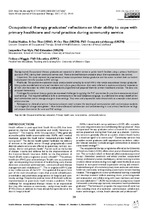| dc.contributor.author | Naidoo, Deshini | |
| dc.contributor.author | Van Wyk, Jacqueline | |
| dc.contributor.author | Waggie, Firdouza | |
| dc.date.accessioned | 2018-08-06T07:11:56Z | |
| dc.date.available | 2018-08-06T07:11:56Z | |
| dc.date.issued | 2017 | |
| dc.identifier.citation | Naidoo, D. et al. (2017). Occupational therapy graduates’ reflections on their ability to cope with primary healthcare and rural practice during community service. South African Journal of Occupational Therapy, 47(3): 39-45 | en_US |
| dc.identifier.issn | 0038-2337 | |
| dc.identifier.uri | http://dx.doi.org/10.17159/2310-3833/2017/v47n3a7 | |
| dc.identifier.uri | http://hdl.handle.net/10566/3926 | |
| dc.description.abstract | BACKGROUND: Occupational therapy graduates are expected to deliver service in public health facilities using a primary healthcare
approach (PHC) during their community service year. There is limited literature available about their experiences in this context.
OBJECTIVE: This study explored the experiences of novice occupational therapy graduates and the extent to which their curriculum
had prepared them for practice in PHC settings.
METHODS: This qualitative exploratory study used purposive sampling to recruit thirty nine novice occupational therapy graduates.
Using audio-recorded semi-structured interviews and a focus group discussion data were collected to explore participants’ experience
of work and the extent to which their undergraduate programme had prepared them for primary healthcare practice. The data was
analyzed thematically.
FINDINGS: Occupational therapy graduates expressed challenges in applying the PHC approaches for practice in resource-restricted
rural settings. They required additional skills to communicate in the local indigenous language, to understand the various beliefs of the
local communities and to manage change in these settings. They were well prepared for basic clinical skills as a need for urban-based
ethical practice.
RELEVANCE TO CLINICAL PRACTICE: Curriculum planners need to review the teaching of communication skills and introduce students
to strategies for change management. More inter-professional collaboration and service-learning in rural primary healthcare settings
will prepare them better for rural and PHC settings. | en_US |
| dc.language.iso | en | en_US |
| dc.publisher | Occupational Therapy Association of South Africa | en_US |
| dc.rights | This journal provides immediate open access to its content on the principle that making research freely available to the public supports a greater global exchange of knowledge. | |
| dc.subject | Occupational therapy education | en_US |
| dc.subject | Primary health care | en_US |
| dc.subject | Rural practice | en_US |
| dc.subject | Community service | en_US |
| dc.subject | Learning through practice | |
| dc.title | Occupational therapy graduates’ reflections on their ability to cope with primary healthcare and rural practice during community service | en_US |
| dc.type | Article | en_US |
| dc.privacy.showsubmitter | FALSE | |
| dc.status.ispeerreviewed | TRUE | |
| dc.description.accreditation | DHET | |

